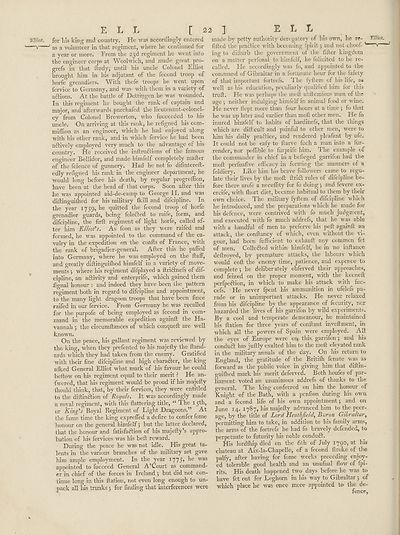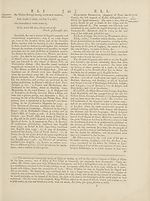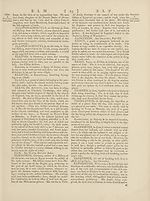Encyclopaedia Britannica, or, a Dictionary of arts, sciences, and miscellaneous literature : enlarged and improved. Illustrated with nearly six hundred engravings > Volume 8, ELE-FOR
(34) Page 22
Download files
Complete book:
Individual page:
Thumbnail gallery: Grid view | List view

E L
Elliot, for Iris king and country.
L [22
o He was accordingly entered
as a volunteer in that regiment, where he continued for
a year or more. From the 23 d regiment he went into
the engineer corps at Woolwich, and made great pro-
grefs in that ftudy, until his uncle Colonel Elliot
brought him in his adjutant of the fecond troop of
horfe grenadiers. With thefe troops he went upon
lervice to Germany, and was with them in a variety of
actions. At the battle of Dettingen he was wounded.
In this regiment he bought the rank of captain and
major, and afterwards purchafed the lieutenant-colonel¬
cy from Colonel Brewerton, who fuccecded to his
uncle. On arriving at this rank, he refigned his com-
miffion as an engineer, which he had enjoyed along
with his other rank, and in which fervice he had been
actively employed very much to the advantage of his
country. He received the inftrudtions of the famous
engineer Bellidor, and made himfelf completely maiter
of the fcience of gunnery. Had he not fo difintereft-
edly refigned his rank in the engineer department, he
would long before his death, by regular progreflion,
have been at the head of that corps. Soon afler this
he was appointed aid-de-camp to George II. and was
diltinguilhed for his military Ikill and difeipline. In
the year 1759, he quitted the fecond troop of horfe
grenadier guards, being feleclcd to raife, form, and
difeipline, the firft regiment of light horfe, called af¬
ter him Elliot's. As foon as they were raifed and
formed, he was appointed to the command of the ca¬
valry in the expedition on the coafts of France, with
the rank of brigadier-general. After this he paffed
into Germany, where he was employed on the flaff,
and greatly diftinguilhed himfelf in a variety of move¬
ments ; where his regiment difplayed a ftriftnefs of dif¬
eipline, an a&ivity and enterprife, which gained them
iignal honour : and indeed they have been the. pattern
regiment both in regard to difeipline and appointment,
to the many light dragoon troops that have been fince
raifed in our fervice. From Germany he was recalled
for the purpofe of being employed as fecond in com¬
mand in the memorable expedition againft the Ha-
vannah •, the circumftances of which conqueft are well
known.
On the peace, his gallant regiment was reviewed by
the king, when they prefented to his majefty the ftand-
ards which they had taken from the enemy. Gratified
with their fine difeipline and high charafter, the king
alked General Elliot what mark of his favour he could
bellow on his regiment equal to their merit ? He. an-
fwered, that his regiment would be proud if his majefty
Ihould think, that, by their fervices, they were entitled
to the diflin&ion of Royals. It was accordingly made
a royal regiment, with this flattering title, “ The 15th,
or King's Royal Regiment of Light Dragoons.” At
the fame time the king exprefled a defire to confer fome
honour on the general himfelf 5 but the latter declared,
that the honour and fatisfaftion of his majefty’s appro¬
bation of his fervices was his bell reward.
During the peace he was not idle. His great ta¬
lents in the various branches of the military art gave
him ample employment. In the year 1775, he was
appointed to fucceed General A’Court as command¬
er in chief of the forces in Ireland *, but did not con¬
tinue long in this ftation, not even long enough to un¬
pack all his trunks; for finding that interferences were
]
ELL
made by petty authority derogatory of his own, he re¬
filled the praftice with becoming Ipirit ; and not choof-
ing to dilturb the government of the filler kingdom
on a matter perfonal to himfelf, he folicited to be re¬
called. He accordingly was fo, and appointed to the
command of Gibraltar in a fortunate hour for the fafety
of that important fortrefs. The fyfiem of his life, a#
well as his education, peculiarly qualified him for this
trull. He was perhaps the moll abftemious man of the
age •, neither indulging himfelf in animal food or wine.
He never flept more than four hours at a time ; fo that
he was up later and earlier than moll other men. He fo
inured himfelf to habits of hardinefs, that the things
which are difficult and painful to other men, were to
him his daily practice, and rendered pleafant by ufe.
It could not be eafy to Itarve fuch a man into a fur-
render, nor poffiblc to furprife him. I he example of
the commander in chief in a befieged garrifon had the
moll perfuafive efficacy in forming the manners of a
foldiery. Like him his brave followers came to regu¬
late their lives by the moll llridl rules of difeipline be¬
fore there arofe a neceflity for fo doing 5 and fevere ex-
ercife, with ftiort diet, became habitual to them by their
own choice. The military fyllem of difeipline which
he introduced, and the preparations which he made for
his defence, were contrived with fo much judgment,
and executed with fo much addrefs, that he was able
with a handful of men to preferve his poll againfl: an
attack, the conllancy of which, even without the vi¬
gour, had been fufficient to exhaull any common fet
of men. Collected within himfelf, he in no inltance
dellroyed, by premature attacks, the labours which
would coll the enemy time, patience, and expence to
complete \ he deliberately obferved their approaches,
and feized on the proper moment, with the keencll
perfpeftion, in which to make his attack with fuc-
cefs. He never fpent his ammunition in ufelefs pa¬
rade or in unimportant attacks. He never relaxed
from his difeipline by the appearance of fecurity, ncr
hazarded the lives of his garrifon by wild experiments.
By a cool and temperate demeanour, he maintained
his llation for three years of conilant inveftment, in
which all the powers of Spain were employed. All
the eyes of Europe were on this garrifon; and his
conduit has jullly exalted him to the moll elevated rank
in the military annals of the day. On his return to
England, the gratitude of the Britilh fenate was. as
forward as the public voice in giving him that diltin-
guilhed mark his merit deferved. Both houfes of par¬
liament voted an unanimous addrefs of thanks to the
general. The king conferred on him the honour of
Knight of the Bath, with a penfion during his own
and a fecond life of his own appointment; and on
June 14. 1787, his majefty advanced him to the peer¬
age, by the title of Lord Heuthjield, Baron Gibraltary
permitting him to take, in addition to his family arms,
the arms of the fortrefs he had fo bravely defended, to
perpetuate to futurity his noble conduft.
His lordfhip died on the 6th of July 1790, at his
chateau at Aix-la-Chapelle, of a fecond ftroke of the
palfy, after having for fome weeks preceding enjoy¬
ed tolerable good health and an unufual flow of fpi-
rits. His death happened two days before he was to
have fet out for Leghorn in his way to Gibraltar ; of
which place he was once more appointed to the de¬
fence,
Elliot.
Elliot, for Iris king and country.
L [22
o He was accordingly entered
as a volunteer in that regiment, where he continued for
a year or more. From the 23 d regiment he went into
the engineer corps at Woolwich, and made great pro-
grefs in that ftudy, until his uncle Colonel Elliot
brought him in his adjutant of the fecond troop of
horfe grenadiers. With thefe troops he went upon
lervice to Germany, and was with them in a variety of
actions. At the battle of Dettingen he was wounded.
In this regiment he bought the rank of captain and
major, and afterwards purchafed the lieutenant-colonel¬
cy from Colonel Brewerton, who fuccecded to his
uncle. On arriving at this rank, he refigned his com-
miffion as an engineer, which he had enjoyed along
with his other rank, and in which fervice he had been
actively employed very much to the advantage of his
country. He received the inftrudtions of the famous
engineer Bellidor, and made himfelf completely maiter
of the fcience of gunnery. Had he not fo difintereft-
edly refigned his rank in the engineer department, he
would long before his death, by regular progreflion,
have been at the head of that corps. Soon afler this
he was appointed aid-de-camp to George II. and was
diltinguilhed for his military Ikill and difeipline. In
the year 1759, he quitted the fecond troop of horfe
grenadier guards, being feleclcd to raife, form, and
difeipline, the firft regiment of light horfe, called af¬
ter him Elliot's. As foon as they were raifed and
formed, he was appointed to the command of the ca¬
valry in the expedition on the coafts of France, with
the rank of brigadier-general. After this he paffed
into Germany, where he was employed on the flaff,
and greatly diftinguilhed himfelf in a variety of move¬
ments ; where his regiment difplayed a ftriftnefs of dif¬
eipline, an a&ivity and enterprife, which gained them
iignal honour : and indeed they have been the. pattern
regiment both in regard to difeipline and appointment,
to the many light dragoon troops that have been fince
raifed in our fervice. From Germany he was recalled
for the purpofe of being employed as fecond in com¬
mand in the memorable expedition againft the Ha-
vannah •, the circumftances of which conqueft are well
known.
On the peace, his gallant regiment was reviewed by
the king, when they prefented to his majefty the ftand-
ards which they had taken from the enemy. Gratified
with their fine difeipline and high charafter, the king
alked General Elliot what mark of his favour he could
bellow on his regiment equal to their merit ? He. an-
fwered, that his regiment would be proud if his majefty
Ihould think, that, by their fervices, they were entitled
to the diflin&ion of Royals. It was accordingly made
a royal regiment, with this flattering title, “ The 15th,
or King's Royal Regiment of Light Dragoons.” At
the fame time the king exprefled a defire to confer fome
honour on the general himfelf 5 but the latter declared,
that the honour and fatisfaftion of his majefty’s appro¬
bation of his fervices was his bell reward.
During the peace he was not idle. His great ta¬
lents in the various branches of the military art gave
him ample employment. In the year 1775, he was
appointed to fucceed General A’Court as command¬
er in chief of the forces in Ireland *, but did not con¬
tinue long in this ftation, not even long enough to un¬
pack all his trunks; for finding that interferences were
]
ELL
made by petty authority derogatory of his own, he re¬
filled the praftice with becoming Ipirit ; and not choof-
ing to dilturb the government of the filler kingdom
on a matter perfonal to himfelf, he folicited to be re¬
called. He accordingly was fo, and appointed to the
command of Gibraltar in a fortunate hour for the fafety
of that important fortrefs. The fyfiem of his life, a#
well as his education, peculiarly qualified him for this
trull. He was perhaps the moll abftemious man of the
age •, neither indulging himfelf in animal food or wine.
He never flept more than four hours at a time ; fo that
he was up later and earlier than moll other men. He fo
inured himfelf to habits of hardinefs, that the things
which are difficult and painful to other men, were to
him his daily practice, and rendered pleafant by ufe.
It could not be eafy to Itarve fuch a man into a fur-
render, nor poffiblc to furprife him. I he example of
the commander in chief in a befieged garrifon had the
moll perfuafive efficacy in forming the manners of a
foldiery. Like him his brave followers came to regu¬
late their lives by the moll llridl rules of difeipline be¬
fore there arofe a neceflity for fo doing 5 and fevere ex-
ercife, with ftiort diet, became habitual to them by their
own choice. The military fyllem of difeipline which
he introduced, and the preparations which he made for
his defence, were contrived with fo much judgment,
and executed with fo much addrefs, that he was able
with a handful of men to preferve his poll againfl: an
attack, the conllancy of which, even without the vi¬
gour, had been fufficient to exhaull any common fet
of men. Collected within himfelf, he in no inltance
dellroyed, by premature attacks, the labours which
would coll the enemy time, patience, and expence to
complete \ he deliberately obferved their approaches,
and feized on the proper moment, with the keencll
perfpeftion, in which to make his attack with fuc-
cefs. He never fpent his ammunition in ufelefs pa¬
rade or in unimportant attacks. He never relaxed
from his difeipline by the appearance of fecurity, ncr
hazarded the lives of his garrifon by wild experiments.
By a cool and temperate demeanour, he maintained
his llation for three years of conilant inveftment, in
which all the powers of Spain were employed. All
the eyes of Europe were on this garrifon; and his
conduit has jullly exalted him to the moll elevated rank
in the military annals of the day. On his return to
England, the gratitude of the Britilh fenate was. as
forward as the public voice in giving him that diltin-
guilhed mark his merit deferved. Both houfes of par¬
liament voted an unanimous addrefs of thanks to the
general. The king conferred on him the honour of
Knight of the Bath, with a penfion during his own
and a fecond life of his own appointment; and on
June 14. 1787, his majefty advanced him to the peer¬
age, by the title of Lord Heuthjield, Baron Gibraltary
permitting him to take, in addition to his family arms,
the arms of the fortrefs he had fo bravely defended, to
perpetuate to futurity his noble conduft.
His lordfhip died on the 6th of July 1790, at his
chateau at Aix-la-Chapelle, of a fecond ftroke of the
palfy, after having for fome weeks preceding enjoy¬
ed tolerable good health and an unufual flow of fpi-
rits. His death happened two days before he was to
have fet out for Leghorn in his way to Gibraltar ; of
which place he was once more appointed to the de¬
fence,
Elliot.
Set display mode to:
![]() Universal Viewer |
Universal Viewer | ![]() Mirador |
Large image | Transcription
Mirador |
Large image | Transcription
Images and transcriptions on this page, including medium image downloads, may be used under the Creative Commons Attribution 4.0 International Licence unless otherwise stated. ![]()
| Permanent URL | https://digital.nls.uk/192263861 |
|---|
| Attribution and copyright: |
|
|---|
| Description | Ten editions of 'Encyclopaedia Britannica', issued from 1768-1903, in 231 volumes. Originally issued in 100 weekly parts (3 volumes) between 1768 and 1771 by publishers: Colin Macfarquhar and Andrew Bell (Edinburgh); editor: William Smellie: engraver: Andrew Bell. Expanded editions in the 19th century featured more volumes and contributions from leading experts in their fields. Managed and published in Edinburgh up to the 9th edition (25 volumes, from 1875-1889); the 10th edition (1902-1903) re-issued the 9th edition, with 11 supplementary volumes. |
|---|---|
| Additional NLS resources: |
|

